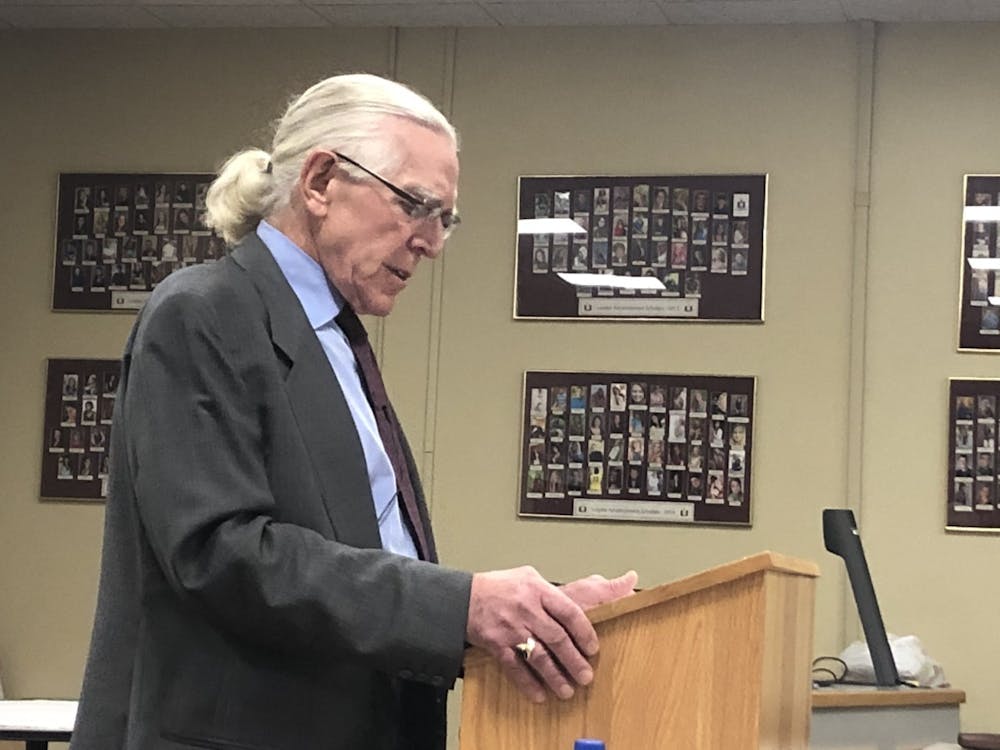Alumnus Gene Ragland reflects on collaboration with CM Life in the '60s
In 1965, America was still healing after the assassination of President John F. Kennedy in 1963, young people protested against U.S. involvement in Vietnam, and as Dr. Martin Luther King led voter registration drives throughout the south, the civil rights movement reached its peak.
Central Michigan University was not exempt from the political and social movements that circulated throughout the U.S. in the '60s. On Jan. 15, Central Michigan Life headlines proclaimed racial discrimination in off-campus housing.
At the forefront of one of CM Life's most significant journalism projects of all time, was Vice President of the Student Body and President of the Student Senate, Gene Ragland.
Ragland returned to CMU Oct. 24 to deliver a guest lecture about the activism he engaged in as a student. His lecture was sponsored by the Office of Institutional Diversity, Equity and Inclusion.
Ragland began pursuing his Bachelor of Science degree in 1962. When he arrived at CMU, the university was going through a transition – evolving from a teacher's school, Central Michigan Normal College, to Central Michigan University. Judson Foust became president of the newly-named university on July 1, 1959.
"It was a time of social and cultural awareness at CMU and Bob Dylan was out there singing 'The Times They Are a-Changin,'" Ragland said. "Equal rights were a big issue and civil rights were on everyone's minds."
Then-Managing Editor of CM Life, Tom Needles, generated an idea for an experiment. It involved a white student and a black student applying to rent at fifteen different university-approved, off-campus housing units.
Ragland was approached by Needles to be the white student in the survey and CMU football player, Cecil Rice was to be the black student.
At the end of the investigation, Ragland was approved to live in all 15 housing units, whereas Rice was only accepted into five.
The headline read, "Survey Shows Discrimination in Off-Campus Housing Units: Negro turned away by 10 of 15 owners."
The article sparked immediate uprisings from students and Mount Pleasant community members.
"I knew to get the information out was the right thing to do, I was in full activist-mode at that time," Ragland said. "I had gone down to listen to Martin Luther King speak at Michigan State University... he gave a powerful, powerful message about how all men are created equal and endowed with the same rights."
A march was organized by a group of Mount Pleasant clergy members, about 350 students, faculty and community members were in attendance. The crowd had marched from the university to the first methodist church. Then-President of the Student Body, Joe Sweeney stood in the march and offered his grievances.
"We don't need to go to Selma, we don't need to go to Detriot," Sweeny said. "All we need to do is retrace the steps we just walked to see where the problem is, it's here in our own community."
Another march occurred the day prior, in which 30 black CMU students marched silently to all the buildings on campus. This march didn't receive as much attention as the organized clergy march.
Ragland said the official response from President Foust was that there "wasn't any problem here and someone is just trying to start one."
Ragland's parents had received a letter after the article was published, threatening him and his family.
"If your son wants to be with a colored boy, that's okay. But we in this community don't appreciate his kind, and if he wants to come here and stir up trouble, he may find that that's exactly what he'll get," the letter read.
Later that year, the board of trustees passed a nondiscrimination requirement for approved off-campus housing and Ragland received the David H. Morgan Leadership Award and was elected to president of the student body in his senior year.
Ragland went on to obtain a Doctor of Medicine degree from the University of Michigan. He served as a physician to the U.S. Navy Medical Corp. during the Vietnam war and lived out a successful career as a doctor. However, his experiences at CMU and his activist mentality have latched to him throughout his life.
"Central Michigan Life at that time was extremely important because it was one of the only few vehicles in which students could be informed of what was really going on," Ragland said. "And it was especially a beacon for me."







